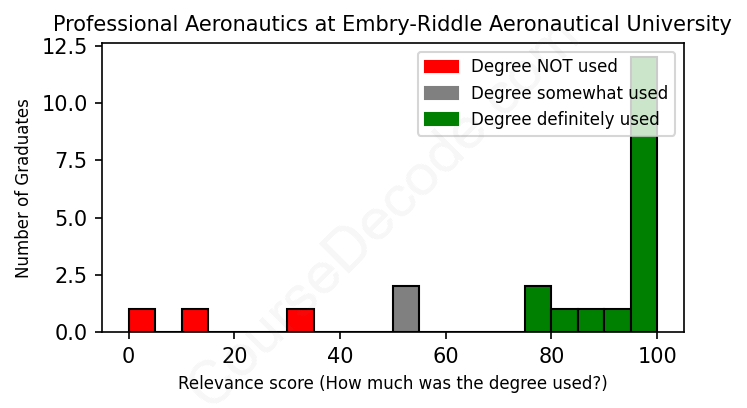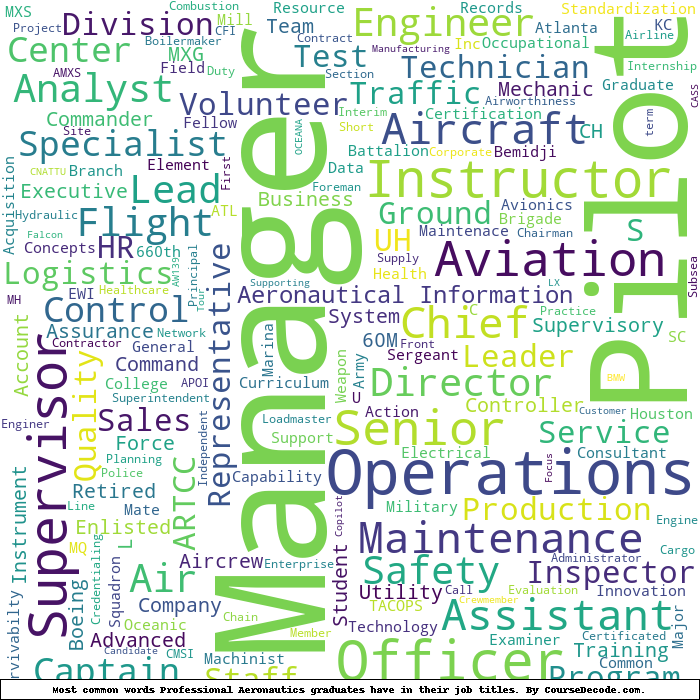
First, some facts. Of the Professional Aeronautics graduates from Embry-Riddle Aeronautical University we've analyzed , here's how many have used (or NOT used) their degree in their career:

These are estimates based on AI analysis of 22 LinkedIn profiles (see below).
The verdict? Significantly above average. Overall, with an average relevance score of 79%, Professional Aeronautics graduates from Embry-Riddle Aeronautical University have a much higher likelihood (+12%) of finding work in this field compared to the average graduate across all fields:
And for comparison, here's the chart for all profiles we've looked at across all degrees.
Also, after graduating, 45% of these graduates have pursued further education other than another Bachelor's degree (such as a Masters degree or other), compared to the average across all profiles of 35%. This suggests you may need more than just a Bachelors degree to be competitive as a Professional Aeronautics graduate.
See the details:
|
Relevance score: 100% We think this person has gone into a career highly relevant to their degree. We think this person has gone into a career highly relevant to their degree.
DEGREE INFOGraduated in 2010 from Embry-Riddle Aeronautical University with a Bachelor's degree in Professional Aeronautics. Also pursued further education since (see below). JOB HISTORY SINCE GRADUATIONProduction Controller United States Department of the Air Force May 2024 - Present FURTHER DEGREES DONE SINCE GRADUATINGMaster of Science - MSEmbry-Riddle Aeronautical University 2021 - 2023 ABOUTNo information provided. |
The top 10 most common jobs done by the graduates we've analyzed (ranked most common to least) are:
When analyzing the careers of graduates from Embry-Riddle Aeronautical University with a degree in Professional Aeronautics, a significant number of them have gravitated towards roles that are deeply steeped in aviation knowledge and skills. Many individuals have held positions such as pilots, safety officers, and various engineering roles within the military and aviation industry—what you'd expect from a program focused on aeronautics. For instance, roles like CH-47 Pilot in the Army and Air Traffic Control Supervisors at the FAA are direct manifestations of the foundational knowledge and training these graduates received. These positions leverage a variety of skills inherent to aeronautics, from operating aircraft to implementing safety protocols, demonstrating that many graduates have utilized their education effectively in their respective fields.
However, not all job placements have remained strictly relevant to aeronautics. A few graduates found themselves in roles that bear little resemblance to what they studied, such as quality control managers at corporations like PepsiCo or project managers in healthcare. These positions often require transferable skills like leadership and management but lack a direct connection to the core aeronautical knowledge garnered from their degree. Overall, while a large portion of jobs held by those with a Professional Aeronautics degree align closely with their studies, there are noticeable exceptions where individuals pursued career paths that diverged significantly from aviation. This blend of relevant and less relevant positions highlights the versatility of an aeronautics degree, allowing for career opportunities in various industries, even if they don't directly engage with the aviation industry.
Here is a visual representation of the most common words in job titles for Professional Aeronautics graduates (this is across all Professional Aeronautics graduates we've analyzed, not just those who went to Embry-Riddle Aeronautical University):

When you look at the career trajectories of graduates from Embry-Riddle Aeronautical University with a degree in Professional Aeronautics, it’s pretty clear that many find themselves in roles closely related to aviation. Right after graduation, a lot of these folks land roles like pilots, military instructors, or maintenance technicians. For example, many of the graduates became pilots for the Army or Air Force, or they took on roles in aviation maintenance and safety for various organizations, including the FAA. It’s a solid start, especially for those looking to build a career in aviation right out of the gate.
Fast forward five to ten years later, and you see that trend continuing. Many of these graduates move up the ranks into managerial or specialized technical roles within the aviation sector, whether that’s in engineering, air traffic control, or safety inspection. Their career paths often lead them to leadership roles within the military or the FAA, which shows that their experience and education are paying off. However, there are some who have diverged from a strictly aviation career—like those who ended up in managerial roles at non-aerospace companies or even healthcare-related positions. Overall, though, the majority of alumni seem to do well in aviation-related careers, which bodes well for anyone considering this path.
Honestly, a Bachelor’s degree in Professional Aeronautics at Embry-Riddle is no walk in the park, but it’s not necessarily the hardest thing out there either. Embry-Riddle has a solid reputation for its aviation programs, so you can expect some pretty rigorous coursework, especially in subjects like aviation safety, aerodynamics, and technical communications. You’ll be juggling math, science, and a lot of specialized knowledge, but if you’re passionate about aviation and stay organized, it’s definitely manageable. And with all the hands-on experience you might get, it can actually be really engaging if you love that stuff! Just be prepared to put in some serious effort, and you'll do fine.
Most commonly, in the LinkedIn profiles we've looked at, it takes people 4 years to finish a Bachelor degree in Professional Aeronautics.
From the profiles you've shared, it looks like most of these Professional Aeronautics graduates from Embry-Riddle have done pretty well for themselves. Many have landed jobs with the military or top aviation companies like Delta, GE Aerospace, and even the FAA, which usually come with decent salaries and benefits. Careers in aviation and aeronautics generally offer solid pay, especially as you climb the ranks or gain specialized skills. For instance, positions like pilot or program manager often lead to six-figure salaries, especially with experience. So, if you're thinking about pursuing a similar path, it seems like a smart move if you're aiming for financial stability and a rewarding career in aviation!
Here is a visual representation of the most common words seen in the "about" section of LinkedIn profiles who have a Bachelor degree in Professional Aeronautics (this is across all Professional Aeronautics graduates we've analyzed, not just those who went to Embry-Riddle Aeronautical University). This may or may not be useful:

Here are all colleges offering a Bachelor degree in Professional Aeronautics (ordered by the average relevance score of their Professional Aeronautics graduates, best to worst) where we have analyzed at least 10 of their graduates:
| College | Score | Count |
|---|---|---|
 Embry-Riddle Aeronautical University Embry-Riddle Aeronautical University
|
79 | 22 |